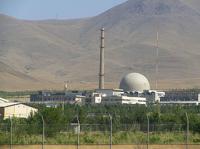-
New X-ray method could detect nuclear materials

Inspectors need tools to help find nuclear materials hidden behind thick shielding or smuggled inside any of the 100 million-plus cargo containers shipped around the world each year. Uranium is perhaps the easiest nuclear material to obtain and hide. Physicists have demonstrated that their unconventional laser-based X-ray machine could provide a new defense against nuclear terrorism. The scientists used the laser-driven X-ray source to produce an image of a uranium disk no bigger than a stack of three nickels and hidden between 3-inch steel panels.
-
-
Boston Bomber ordered to pay $101 million to victims

Dzhokhar Tsarnaev, 22, the Boston Marathon bomber, has been ordered to pay more than $101 million to his victims. In June, Tsarnaev was sentenced to death for his role in the 2013 bomb attack. The attack killed three people and injured more than 260.
-
-
U.S. air strike on ISIS vault destroys “millions of dollars”
The Pentagon has released footage of an airstrike against an ISIS bank in Mosul, Iraq. The strike destroyed millions of dollars the Islamist organization kept at the bank’ vaults. The attack took place on 11 January. A video footage shows large plumes of smoke emerging above the building after it was destroyed by two 2,000 pound bombs, followed by clouds of currency bills drifting above the explosion.
-
-
Bangladesh Islamist militants sentenced for bombing attacks
Bangladeshi court sentences five members of the Islamist Jamaat-ul-Mujahideen to ten years in jail for masterminded a series of bombings in 2005 as part of a campaign to impose Sharia law in the moderate Muslim nation. The Islamist group had been quiet since six of its leaders were executed in 2007, but lately has resumed its terrorist attacks, targeting pro-democracy bloggers and activists for religious minorities.
-
-
Global persecution of Christians more extreme than ever before: Report
Religious fundamentalism is sweeping the globe, according to figures released the other day as part of the Open Doors 2016 World Watch List. Systematic religious cleansing is widespread across Africa and the Middle East. Every year well over 100 million Christians are persecuted because of their beliefs. Open Doors reports that North Korea remains the worst place to be a Christian while Iraq (2) has replaced Somalia (7) as the second most dangerous place to be a Christian. Eritrea, now nicknamed the “North Korea of Africa” due to high levels of dictatorial paranoia, follows at number three. Afghanistan (4), Syria (5), and Pakistan (6) are the next most difficult places for Christians.
-
-
No immediate impact on Pennsylvania from DHS update to REAL ID deadlines
The Pennsylvania Department of Transportation said there would be no immediate impact to Pennsylvania citizens is expected based on the recent announcement by DHS regarding its schedule for implementing the federal REAL ID Act of 2005. The act deals with identification requirements for boarding federally regulated commercial aircraft.
-
-
Ash Carter unveils a broader, more robust campaign to defeat ISIS

Defense Secretary Ashton Carter said that 2016 will be the year the American-led coalition attacks ISIS in its strongholds of Raqqa and Mosul, in what may be the Obama administration’s last chance to inflict a lasting defeat on the Islamist group. In a speech on Wednesday, Carter said that he had “big arrows” pointing at the Syrian and Iraqi cities that constitute Isis’s “center of gravity.” The campaign against ISIS will expand beyond these countries, Carter said, indicating that the drone campaigns conducted against militants in Yemen, Somalia, and Pakistan will target the militant group in other countries, most likely in north and west Africa.
-
-
7 killed in ISIS suicide bombings, shootings in Indonesian capital

ISIS has claimed responsibility for a deadly attack in Jakarta earlier this morning (Thursday). Indonesian authorities say that the five ISIS attackers were helped by the local Jemaah Islamiyah group. Jemaah Islamiyah was behind a 2009 explosions at two Jakarta hotels that killed seven people, and the 2002 bombings at a Bali nightclub which killed 202 people, mainly foreign tourists. Jemaah Islamiyah is similar to ISIS in that it aims to establish an Islamic “caliphate” in south-east Asian countries including Indonesia, Thailand, Singapore, Malaysia, and the Philippines.
-
-
Family of ISIS victim sues Twitter for enabling terrorism
The family of Lloyd “Carl” Fields Jr., who was killed last year in an attack in Amman, the capital of Jordan in an ISIS shooting, is suing Twitter, claiming the network has not done enough about the spread of the group’s deadly reach. The complaint claims that the shooting might never have happened had Twitter not existed.
-
-
Iran decommissions Arak nuclear reactor

Iran has decommissioned its Arak nuclear reactor by removing the sensitive core, and UN inspectors are inspecting the reactor today (Thursday) in order to verify the removal of the core, as required by the nuclear agreement between Iran and the P5+1 powers. The removal of the core of the reactor will make it impossible for Iran to pursue the plutonium path to the bomb. The dismantling of about 13,000 uranium enrichment centrifuges, as called for by the agreement, will make it impossible for Iran to use enriched uranium to build a bomb for the duration of the agreement.
-
-
U.K. bail procedure to be changed to prevent jihadists from leaving country while on bail
Prime Minister David Cameron has pledged to oversee a shakeup of police bail procedures after a counterterrorism chief said the procedures were “weak and “toothless” and allowed jihadists to act with impunity. The weaknesses in the current bail system were highlighted by the revelations that Siddhartha Dhar, the Londoner suspected of being Isil’s new ‘Jihadi John’, was able to leave the United Kingdom without any problem while on bail despite being told to surrender his passport. Under current law, the police are powerless to escort a released suspect home to seize their passport because of bail regulations and human rights laws.
-
-
Suicide bomber kills 15 outside polio clinic in Quetta, Pakistan
The Taliban’s violent campaign against bringing Western medicine to children in Pakistan, a campaign which focused primarily on disrupting the efforts of the Pakistani government and international NGOs to fight polio, continues. Earlier today (Wednesday), a suicide bomber has killed at least fifteen people, most of them police, outside a polio eradication center in the city of Quetta in western Pakistan.
-
-
Istanbul terrorist was a Syrian asylum seeker
Turkish media report that the terrorist who killed ten tourists in Istanbul entered the country as an asylum seeker from Syria. Most of the dead and wounded in the attack were German nationals. The Turkis police was able to identify the attacker quickly because his fingerprints were already stored in Turkey’s the refugee biometric database.
-
-
Seismologists "hear" the nuclear explosions in North Korea

International experts are far from convinced that North Korea actually conducted its first H-bomb test, which was reported by the country last week.Seismology alone cannot tell whether it was a hydrogen bomb or not, but seismologists say that what emerges from the existing data is that last week’s seismic events in North Korea were slightly smaller than a similar event in 2013.
-
-
Travel association to DHS: Tell Congress about visa overstays before tourism is restricted
The U.S. Travel Association is urging DHS to address people who stay overstay the length of their approved visas before placing new restrictions on visa waiver programs that are designed to boost U.S. tourism. “We should not even begin to discuss further improvements to visa security without much-needed data from the Department of Homeland Security on visa overstays,” the association says.
-
More headlines
The long view
Factories First: Winning the Drone War Before It Starts
Wars are won by factories before they are won on the battlefield,Martin C. Feldmann writes, noting that the United States lacks the manufacturing depth for the coming drone age. Rectifying this situation “will take far more than procurement tweaks,” Feldmann writes. “It demands a national-level, wartime-scale industrial mobilization.”
No Nation Is an Island: The Dangers of Modern U.S. Isolationism
The resurgence of isolationist sentiment in American politics is understandable but misguided. While the desire to refocus on domestic renewal is justified, retreating from the world will not bring the security, prosperity, or sovereignty that its proponents promise. On the contrary, it invites instability, diminishes U.S. influence, and erodes the democratic order the U.S. helped forge.
Fragmented by Design: USAID’s Dismantling and the Future of American Foreign Aid
The Trump administration launched an aggressive restructuring of U.S. foreign aid, effectively dismantling the United States Agency for International Development (USAID). The humanitarian and geopolitical fallout of the demise of USAID includes shuttered clinics, destroyed food aid, and China’s growing influence in the global south. This new era of American soft power will determine how, and whether, the U.S. continues to lead in global development.
Water Wars: A Historic Agreement Between Mexico and US Is Ramping Up Border Tension
As climate change drives rising temperatures and changes in rainfall, Mexico and the US are in the middle of a conflict over water, putting an additional strain on their relationship. Partly due to constant droughts, Mexico has struggled to maintain its water deliveries for much of the last 25 years, deliveries to which it is obligated by a 1944 water-sharing agreement between the two countries.
How Disastrous Was the Trump-Putin Meeting?
In Alaska, Trump got played by Putin. Therefore, Steven Pifer writes, the European leaders and Zelensky have to “diplomatically offer suggestions to walk Trump back from a position that he does not appear to understand would be bad for Ukraine, bad for Europe, and bad for American interests. And they have to do so without setting off an explosion that could disrupt U.S.-Ukrainian and U.S.-European relations—all to the delight of Putin and the Kremlin.”
How Male Grievance Fuels Radicalization and Extremist Violence
Social extremism is evolving in reach and form. While traditional racial supremacy ideologies remain, contemporary movements are now often fueled by something more personal and emotionally resonant: male grievance.
